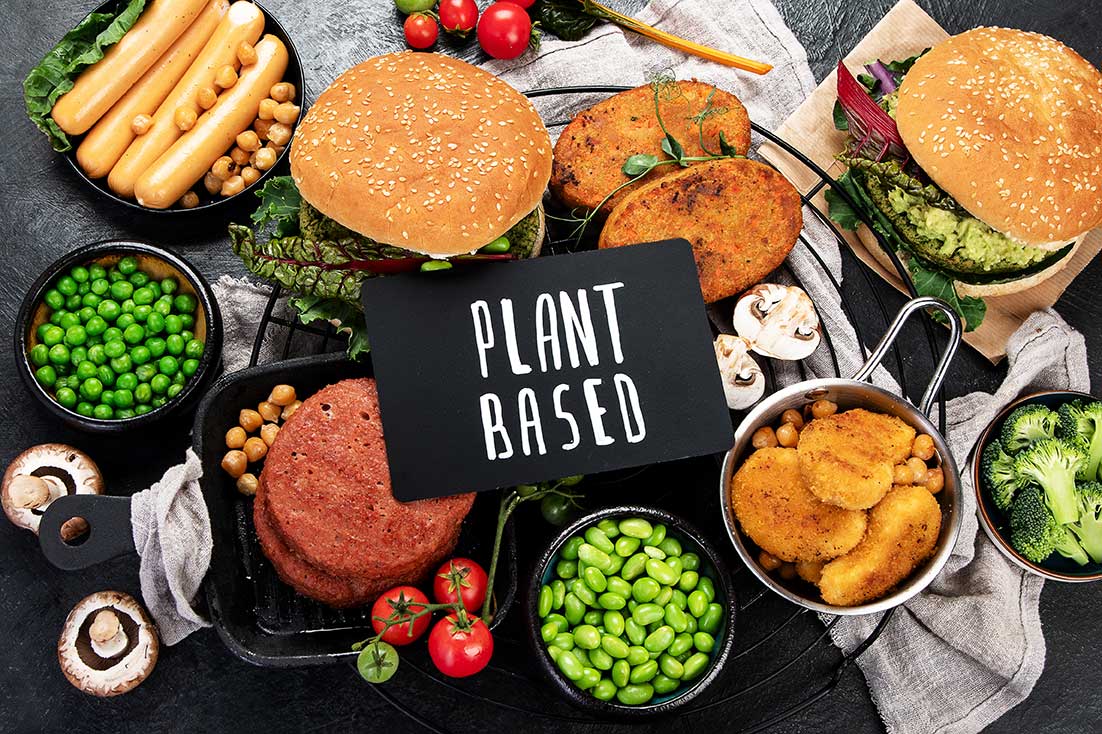Everything About Healthy Food: Advantages of Taking On Plant Based Alternatives
The conversation bordering plant-based diet plans has actually obtained substantial focus in current years. Numerous people are discovering the prospective health advantages, nutritional advantages, and environmental impacts associated with these nutritional choices. As people end up being a lot more aware of their food's influence on well-being and sustainability, inquiries arise about the functionalities of adopting such a way of life. What specific modifications can one anticipate, and exactly how might these choices improve not only personal health yet also the planet's future?
Comprehending Plant-Based Diet Plans
Many people connect plant-based diet plans mostly with vegetarianism or veganism, these diet plans can incorporate a broad array of consuming patterns that prioritize whole, minimally refined plant foods. Such diet regimens commonly consist of fruits, vegetables, entire grains, seeds, beans, and nuts, while getting rid of or limiting pet products. This flexibility enables people to customize their nutritional options according to dietary needs and individual choices. Some may embrace a mainly plant-based diet regimen while still periodically consuming meat or dairy, usually described as a flexitarian strategy. The focus stays on incorporating even more plant foods, which can result in a varied range of meals and tastes. Understanding these different interpretations of plant-based eating is crucial for appreciating its access and charm in modern food society.
Wellness Benefits of Plant-Based Foods
The health benefits of plant-based foods are substantial, supplying a nutrient thickness benefit that supports general health. Study indicates that these foods can enhance heart health and play a necessary role in efficient weight management. By incorporating much more plant-based options, people may boost their nutritional selections and advertise long-term health and wellness.
Nutrient Thickness Benefit
Nutrient density plays a crucial function in the health and wellness advantages of plant-based foods, making them an engaging option for those looking for a balanced diet plan. Plant-based foods, such as fruits, veggies, beans, nuts, and whole grains, are typically abundant in essential vitamins, minerals, and antioxidants while being reduced in calories. This high nutrient density allows people to consume less calories while still satisfying their dietary requirements. Furthermore, these foods are loaded with dietary fiber, promoting digestive system health and wellness and helping in weight monitoring. By including nutrient-dense plant-based options, consumers can improve their general wellness, support their body immune systems, and minimize the risk of chronic illness. Ultimately, the nutrient density of plant-based foods highlights their importance in a health-conscious way of life.
Heart Wellness Improvement

Weight Management Assistance
Along with advertising heart health and wellness, a plant-based diet can substantially aid in weight administration. This nutritional method stresses whole foods such as fruits, vegetables, legumes, nuts, and entire grains, which are usually reduced in calories and greater in fiber contrasted to animal-based products. The high fiber web content aids boost satiation, minimizing total calorie intake. Plant-based diets are usually abundant in vital nutrients while low in harmful fats, making it less complicated to preserve a healthy weight. Research study suggests that individuals that take on a plant-based way of life have a tendency to have lower body mass indexes (BMIs) and experience more effective weight loss compared to those who eat meat-heavy diets. As a result, welcoming plant-based alternatives is a strategic option for reliable weight management
Nutritional Worth of Plant-Based Ingredients
Plant-based active ingredients are rich in crucial nutrients, offering a varied array of vitamins, minerals, and anti-oxidants that add to total wellness. A comparison of protein sources reveals that while animal products are frequently deemed remarkable, many plant-based options offer sufficient protein and other advantageous compounds. Understanding the nutritional worth of these active ingredients can aid people make notified dietary options.
Vital Nutrients in Plants
Nutrient-rich components found in plants offer a varied selection of crucial nutrients that contribute significantly to total wellness. These ingredients are rich in vitamins A, C, and K, which sustain immune feature, vision, and blood clotting, respectively. On top of that, plants provide vital minerals such as calcium, potassium, and magnesium, vital for heart health and wellness, muscle feature, and bone stamina. The presence of fiber in plant-based foods help food digestion and promotes a healthy and balanced digestive tract microbiome. Antioxidants, discovered abundantly in veggies and fruits, aid battle oxidative stress and lower inflammation. Numerous plant foods are reduced in calories yet high in nutrients, making them an outstanding selection for those seeking to keep a healthy weight while making sure perfect nutrient consumption.

Contrasting Protein Sources
Protein sources differ substantially in their dietary profiles, with plant-based components offering unique benefits. Unlike pet healthy proteins, which typically include saturated fats and cholesterol, plant healthy proteins often tend to be lower in these unhealthy components. Legumes, nuts, seeds, and entire grains are rich in vital amino acids, fiber, vitamins, and minerals. For example, lentils provide high healthy protein material alongside significant iron and folate, while quinoa is a complete protein, using all nine necessary amino acids. Furthermore, plant-based proteins are usually gone along with by antioxidants and phytochemicals that sustain overall wellness. The shift to plant-based healthy protein resources not just improves dietary intake yet likewise aligns with lasting nutritional methods, reducing environmental impact and promoting long-term wellness advantages.
Ecological Effect of Plant-Based Consuming
As recognition of climate adjustment expands, numerous people are exploring lasting nutritional options that can significantly reduce their ecological impact. Plant-based eating has become a considerable factor to decreasing greenhouse gas emissions, which are mostly associated with livestock manufacturing. The farming of fruits, beans, veggies, and grains typically calls for fewer sources, such as water and land, compared to pet farming. Furthermore, plant-based diet regimens can result in reduced deforestation, as much less land is needed for grazing animals or expanding pet feed. By changing in the direction of plant-based alternatives, customers can sustain biodiversity and advertise healthier ecological communities. Overall, accepting plant-based eating not only benefits personal health and wellness however additionally stands for an essential action towards ecological sustainability and preservation initiatives.
Conquering Common Misconceptions
While several people identify the advantages of a plant-based diet regimen, numerous misconceptions frequently discourage them from fully embracing this lifestyle. A common idea is that plant-based diet regimens do not have adequate protein; however, numerous plant sources, such as beans, nuts, and tofu, give ample healthy protein. In addition, some presume that this diet plan is expensive, when in fact, staples like beans, rice, and seasonal veggies can be fairly affordable. An additional misconception is that plant-based consuming is excessively restrictive, whereas it in fact supplies a varied array of foods and flavors. Many stress that a plant-based diet plan might lead to shortages, yet with proper preparation, people can acquire all necessary nutrients, consisting of vitamins and minerals, while appreciating a broad range of scrumptious meals.
Tips for Transitioning to a Plant-Based Lifestyle
Making the change to a plant-based lifestyle can be an improving experience, though it typically calls for some assistance to browse the preliminary adjustments. People are encouraged to start progressively, incorporating more fruits, veggies, beans, and whole grains into their dishes while lowering meat and dairy usage. Dish planning is necessary; preparing a weekly menu can assist reduce the change and avoid final harmful selections. Exploring cooking approaches and brand-new dishes can likewise maintain and improve the experience enjoyment regarding plant-based consuming. Additionally, joining support system or neighborhoods can give inspiration and share valuable tips. Remaining notified regarding nutrition assurances balanced meals, stopping shortages while promoting a healthy, satisfying plant-based way of living.

Delicious Plant-Based Meal Ideas
Checking out delicious plant-based meal concepts can inspire individuals to welcome a more healthy diet regimen. One popular choice is a passionate quinoa salad, featuring cherry tomatoes, cucumber, and a spicy lemon-tahini clothing. Another favorite is a mouthwatering lentil stew, loaded with carrots, celery, and fragrant herbs, excellent for a comforting dinner. For morning meal, over night oats made with almond milk, chia seeds, and covered with fresh berries provide a healthy begin to the day. In addition, a vibrant vegetable stir-fry with tofu and a range of vibrant veggies can be a fast yet pleasing dish. Creamy avocado toast on whole-grain bread, sprinkled with flavors and seeds, supplies a simple yet flavorful snack. These meals showcase here the variety and richness of plant-based eating.

Often Asked Questions
Can a Plant-Based Diet Regimen Supply Enough Healthy Protein?
The inquiry of whether a plant-based diet plan can provide enough protein is common. Countless sources, consisting of vegetables, nuts, seeds, and whole grains, can fulfill protein requires efficiently, supporting a well balanced and nutritious diet regimen for individuals.
Are Plant-Based Diet Regimens Appropriate for Children?
The viability of plant-based diet plans for youngsters depends upon mindful planning. Ample nutrients need to be assured, including vitamins, minerals, and proteins. With proper support, such diets can support healthy and balanced growth and advancement in children.
Exactly how Do I Dine Out on a Plant-Based Diet?
Eating in restaurants on a plant-based diet includes seeking dining establishments with diverse food selections, asking for adjustments, and discovering vegan-friendly options. Preparation ahead and connecting dietary choices can enhance the dining experience while preserving nutritional choices.
What Are Typical Irritants in Plant-Based Foods?
Common allergens in plant-based foods include soy, gluten, nuts, and seeds - Discover More Plant Based Beef. Individuals complying with a plant-based diet regimen ought to be mindful of these allergens and read labels very carefully to stay clear of adverse reactions and guarantee risk-free usage
Can Plant-Based Diets Aid With Weight Reduction?
Research study suggests that embracing a plant-based diet plan might promote weight loss due to its generally lower calorie density and higher fiber content. This combination can enhance satiety, helping individuals manage their caloric consumption effectively. Many people associate plant-based diet regimens primarily with vegetarianism or veganism, these diets can include a wide array of eating patterns that focus on whole, minimally refined plant foods. Nutrient density plays a vital function in the health benefits of plant-based foods, making them an engaging selection for those looking for a balanced diet. Plant-based diets have actually been revealed to substantially boost heart wellness, as they frequently have aspects that support cardiovascular function. In addition to promoting heart health and wellness, a plant-based diet can significantly aid in weight management. An usual idea is that plant-based diet regimens do not have adequate protein; however, many plant sources, such as the original source beans, nuts, and tofu, give adequate protein.